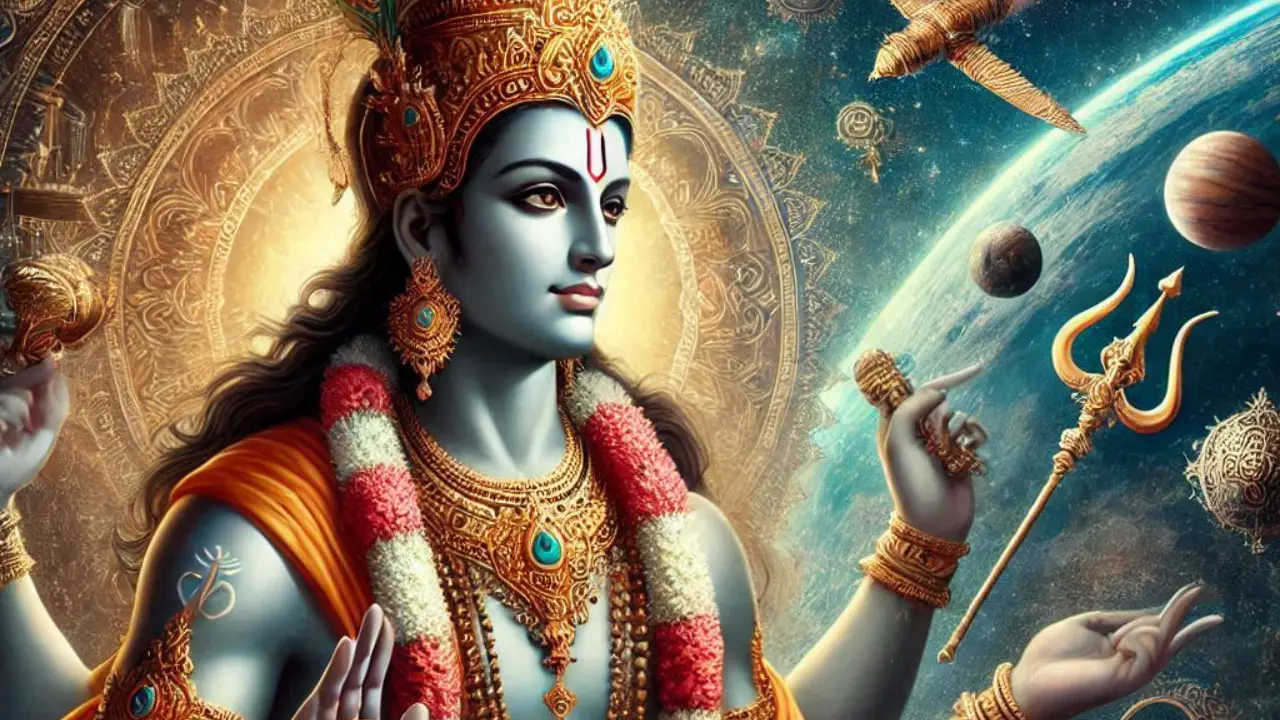Hindu mythology offers a rich tapestry of stories explaining the origins of existence. Among these, Lord Vishnu stands as a key figure in the cosmic cycle of creation, preservation, and destruction. Revered as the preserver in the Hindu trinity (Trimurti), his role in the creation of the universe is intricately tied to balance and order in the universe.
The Story of Creation
According to Hindu scriptures, the process of the creation of the universe begins in the void, where nothing exists except for an infinite cosmic ocean. Lord Vishnu rests upon the great serpent Ananta Shesha, symbolizing timelessness and stability. This serene image portrays Vishnu as the eternal witness of existence.
The act of creation starts with the emergence of a lotus flower from Vishnu’s navel. This lotus is no ordinary bloom—it contains Lord Brahma, the creator of the universe. It is said that Vishnu entrusts Brahma with the task of creating the physical world and its beings, setting the cycle of existence in motion.
This story underscores Vishnu’s role as the enabler of creation, providing the foundation for the world to emerge. His passive yet vital involvement reflects a profound truth: creation is a harmonious blend of effort and divine will.
Symbolism of the Lotus and Vishnu’s Navel
The lotus is a powerful symbol in Hinduism, representing purity, beauty, and detachment. Its emergence from Vishnu’s navel signifies the unfolding of life from a source of divine potential. The navel, central to the human body, becomes the cosmic center in this narrative.
For modern readers, this symbolism can inspire personal growth. Just as the lotus rises above murky waters to bloom, we can overcome challenges to reach our full potential.
Vishnu’s Avatars and Their Role in Sustaining Creation
Vishnu’s role in the creation of the universe extends beyond the initial act. Through his ten avatars, collectively known as the Dashavatara, he intervenes at critical moments to restore balance and ensure the continuation of life. Each avatar reflects a unique aspect of Vishnu’s protective nature, emphasizing his commitment to sustaining creation.
For example, in his first avatar as Matsya (the fish), Vishnu saves the sacred Vedas and humanity during a great deluge. This tale reminds us of the importance of preserving knowledge and protecting life during turbulent times.
The Cosmic Cycle and Vishnu’s Position
Hindu philosophy divides time into four yugas (epochs), each representing a decline in moral values and balance. Vishnu’s role becomes crucial as the preserver, maintaining harmony and counteracting the forces of chaos.
This cyclic view of time highlights the interconnectedness of creation, preservation, and destruction. It encourages us to embrace change as a natural part of life, understanding that endings often pave the way for new beginnings.
Vishnu’s Role in Modern Spiritual Practices
The stories of Vishnu resonate not just in temples or ancient texts but in daily spiritual practices. Many Hindus chant Vishnu Sahasranama, a hymn consisting of 1,000 names of Vishnu, to invoke his blessings. Each name reflects an aspect of his divine qualities, reminding devotees of his omnipresence and benevolence.
In a practical sense, meditating on Vishnu’s qualities can inspire balance in our lives. For instance, his serene posture on Ananta Shesha symbolizes calm amidst chaos—a lesson relevant to modern stress-filled lifestyles.
Real-Life Reflections
Consider the story of a young professional facing constant pressure at work. Inspired by Vishnu’s equanimity, she starts practicing mindfulness, creating a sense of inner peace despite external challenges. This approach allows her to navigate her responsibilities more effectively while maintaining a balanced perspective.
Such stories exemplify how Vishnu’s teachings can be applied in everyday situations, offering solace and guidance.
The Connection Between Vishnu and Human Values
Vishnu’s role in the creation of the universe also emphasizes core human values like patience, compassion, and adaptability. By trusting Brahma to create the universe, Vishnu teaches us the importance of delegation and trust in others’ abilities.
In our lives, this principle can encourage teamwork and collaboration. Whether it’s at work or in family settings, trusting others fosters harmony and shared success.
The Eternal Presence of Vishnu
While Lord Vishnu’s stories are deeply rooted in mythology, their essence transcends time. His presence symbolizes an eternal force that nurtures and protects creation, reminding humanity of the divine within and around us.
Even today, during festivals like Vaikuntha Ekadashi, devotees celebrate Vishnu’s contributions to creation and preservation. These traditions keep his stories alive, connecting the past with the present.
What lessons can you draw from Vishnu’s role in the creation of the universe? Reflect on his qualities of balance, patience, and adaptability. How can you apply these principles to your life?
Share your thoughts or personal experiences in the comments below. Let’s engage in a meaningful discussion and explore Vishnu’s wisdom together!

